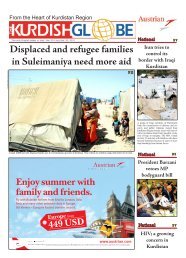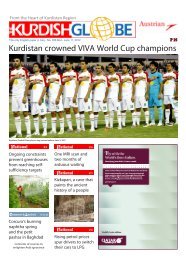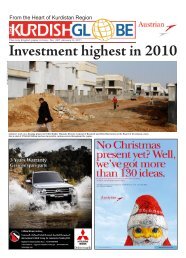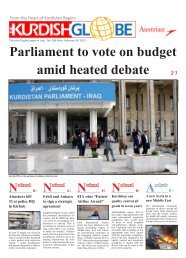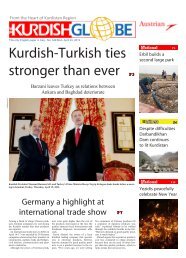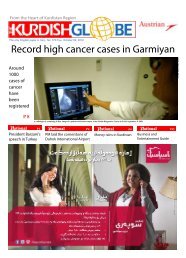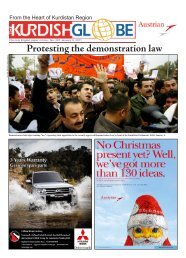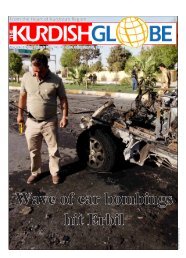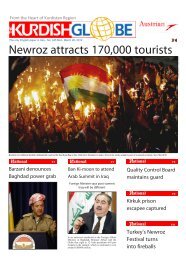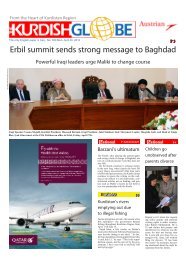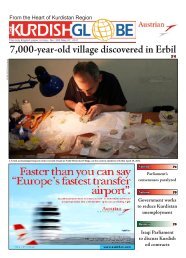Erbil: The host city of sports t ournaments - Kurdish Globe
Erbil: The host city of sports t ournaments - Kurdish Globe
Erbil: The host city of sports t ournaments - Kurdish Globe
Create successful ePaper yourself
Turn your PDF publications into a flip-book with our unique Google optimized e-Paper software.
<strong>The</strong> <strong>Kurdish</strong> <strong>Globe</strong> No. 276, Saturday, October 09, 2010 11<br />
Iraq and its <strong>Kurdish</strong> Question will continue to<br />
be an important foreign policy issue to the U.S.<br />
- Sean Kane, Program Officer with USIP’s Iraq programs<br />
Interviwer:<br />
Wirya Rehmany<br />
What is the place and<br />
importance <strong>of</strong> the Kurdiish<br />
question in U.S. foreeign<br />
policy? Do the U.S.<br />
and European counttries<br />
have any policy or<br />
strategy toward Kurds<br />
as a nation?<br />
<strong>The</strong> <strong>Kurdish</strong> question<br />
in Iraq, and Iraq in gene<br />
eral, remains important<br />
to the foreign policy <strong>of</strong><br />
the United States. This<br />
is especially because the<br />
Obama Administration<br />
sees unresolved Arab-<br />
<strong>Kurdish</strong> issues as one <strong>of</strong><br />
the greatest risks to Iraq’s<br />
stability. However, the<br />
extraordinary amount <strong>of</strong><br />
attention and resources<br />
that the U.S. devoted to<br />
Iraq over the last seven<br />
years will not be repeate<br />
ed. This level <strong>of</strong> focus<br />
on one country and its<br />
internal politics is almost<br />
unparalleled in U.S. histe<br />
tory. Iraq and its <strong>Kurdish</strong><br />
Question will continue to<br />
be an important foreign<br />
policy issues to the U.S.,<br />
but one <strong>of</strong> several priorite<br />
ties rather than the No.<br />
1 concern. In addition,<br />
U.S. domestic politics<br />
are turning away from<br />
foreign policy and secure<br />
rity issues to local issues<br />
like the difficult economie<br />
ic situation back home.<br />
How do you see the situaation<br />
<strong>of</strong> Kurds <strong>of</strong> Iraq?<br />
<strong>The</strong> Kurds and Kurdie<br />
istan Region have made<br />
tremendous progress over<br />
the last 20 years--espece<br />
cially since 2003. Iraq is<br />
now a federal country and<br />
Kurdistan Region has a<br />
high degree <strong>of</strong> autonomy<br />
to manage its own affairs.<br />
Iraqi Kurds also have sene<br />
nior positions in the Iraqi<br />
government and army. In<br />
many ways, given the inte<br />
ternational environment,<br />
this is the best possible<br />
situation for the Kurds <strong>of</strong><br />
Iraq. However, the overae<br />
all environment in Iraq is<br />
evolving as U.S. troops<br />
are withdrawn. <strong>The</strong>re<br />
are major outstanding<br />
issues between the fede<br />
eral government and the<br />
Kurdistan Regional Gove<br />
ernment, including relatie<br />
ing to oil contracts and<br />
disputed territories. How<br />
these issues are handled<br />
could determine whether<br />
the Kurds can be successfe<br />
ful in creating the politice<br />
cal conditions for another<br />
20 years <strong>of</strong> progress.<br />
How do you see the imppact<br />
<strong>of</strong> the departure <strong>of</strong><br />
U.S. forces from Iraq on<br />
the <strong>Kurdish</strong> region and<br />
U.S.-<strong>Kurdish</strong> relations<br />
in the future?<br />
<strong>The</strong> U.S. forces’ departe<br />
ture affects the strategic<br />
situation <strong>of</strong> the Kurdistan<br />
Region, which had hoped<br />
to see a long-term U.S.<br />
troop presence to help<br />
guarantee its security.<br />
In my view, the <strong>Kurdish</strong><br />
leadership took a very<br />
strategic approach to the<br />
2003 U.S.-led invasion.<br />
<strong>The</strong>ir challenge now is<br />
to be equally strategic in<br />
handling the departure<br />
<strong>of</strong> U.S. troops so that<br />
past achievements can be<br />
consolidated. Kirkuk and<br />
the other disputed territore<br />
ries are very important<br />
in this respect. <strong>The</strong> conte<br />
tinuing lack <strong>of</strong> agreement<br />
about the southern limit<br />
<strong>of</strong> the entire Iraqi Kurdie<br />
istan Region is a major<br />
source <strong>of</strong> uncertainty and<br />
tension today, and could<br />
be a source <strong>of</strong> damaging<br />
instability and even confe<br />
flict in the future.<br />
What will be U.S. policcy<br />
toward the struggle<br />
between Baghdad and<br />
<strong>Erbil</strong>, especially conccerning<br />
the Kirkuk<br />
question?<br />
In my opinion, the U.S.<br />
message to Baghdad and<br />
<strong>Erbil</strong> will be that these isse<br />
sues can only be resolved<br />
by internal agreements<br />
among Iraqis themselves.<br />
<strong>The</strong> U.S. will support<br />
Iraqi efforts to resolve this<br />
struggle, but is unlikely<br />
to present its own plan.<br />
In the near term, I believe<br />
that the U.S., along with<br />
UNAMI, will encourage<br />
Baghdad and <strong>Erbil</strong> to este<br />
tablish a political process<br />
on their outstanding isse<br />
sues once a new governme<br />
ment is formed. If the<br />
parties are willing to do<br />
this and both sides show<br />
flexibility on difficult<br />
subjects like Kirkuk, the<br />
U.S. would likely activele<br />
ly support the process and<br />
could be open to providie<br />
ing some guarantees for a<br />
negotiated agreement. If<br />
the parties are not, U.S.<br />
involvement on these isse<br />
sues might become rede<br />
duced over time.<br />
What are your expectattions<br />
and advice for the<br />
Iraqi KRG (especially<br />
on dealing with us in<br />
the future)?<br />
My advice to the Kurdiste<br />
tan Regional Government<br />
is to be fully aware <strong>of</strong> the<br />
changing place <strong>of</strong> Iraq<br />
and the <strong>Kurdish</strong> Queste<br />
tion in U.S. politics. <strong>The</strong><br />
U.S. wants to help Baghde<br />
dad and <strong>Erbil</strong> resolve<br />
their issues and prevent<br />
any repeat <strong>of</strong> past trage<br />
edies. But it is no longer<br />
the case that U.S. leaders<br />
will be judged politically<br />
on events in Iraq as was<br />
the case three or four<br />
years ago. As a result,<br />
the policy decisions and<br />
actions the KRG takes are<br />
more and more important<br />
in determining what kind<br />
<strong>of</strong> long-term relationship<br />
will develop.<br />
Sean Kane is a Program<br />
Officer with USIP’s Iraq<br />
programs. Prior to joini<br />
ing the Institute, he worked<br />
as a Political Affairs Offi<br />
ficer with the United Nati<br />
tions Assistance Mission for<br />
Iraq (UNAMI) in Baghdad,<br />
<strong>Erbil</strong>, Mosul, and Kirkuk<br />
from 2006-09. At UNAMI,<br />
Sean worked on a range <strong>of</strong><br />
political issues including<br />
advising the Iraqi Parliami<br />
ment during the 2007 consi<br />
stitutional review, analysis<br />
<strong>of</strong> oil and revenue sharing<br />
legislation, monitoring the<br />
2009 provincial elections,<br />
and preparing UNAMI’s<br />
reports to the government<br />
<strong>of</strong> Iraq and the Kurdistan<br />
Regional Government on<br />
Kirkuk and other disputed<br />
internal boundaries. From<br />
2009-10, Sean also served<br />
as a Middle East Desk Offi<br />
ficer with the United Nati<br />
tions Department <strong>of</strong> Politici<br />
cal Affairs, covering issues<br />
related to the Middle East<br />
Peace Process and supporti<br />
ing the Secretary-General’s<br />
participation in the Middle<br />
East Quartet.<br />
From 2005-06, Sean was<br />
a Program Officer with the<br />
U.S. government’s Millenni<br />
nium Challenge Corporati<br />
tion (MCC). At MCC, he<br />
conducted economic growth<br />
analysis and designed moniti<br />
toring and evaluation systi<br />
tems for Millennium Challi<br />
lenge Compact proposals<br />
from the governments <strong>of</strong><br />
Mali, Senegal, and Sri Lanki<br />
ka. During the summer <strong>of</strong><br />
2004, he worked for the Offi<br />
fice <strong>of</strong> the High Representati<br />
tive in Bosnia-Herzegovina<br />
on internal debt and propei<br />
erty restitution issues resulti<br />
ing from the 1990s conflict.<br />
He was previously an Assi<br />
sociate Lecturer/Researcher<br />
with the University <strong>of</strong> the<br />
Witwatersrand in South Afri<br />
rica, and a Senior Research<br />
Analyst at the U.S.-based<br />
strategy consulting firm<br />
Dove Associates.<br />
Sean has written on the<br />
subjects <strong>of</strong> natural resource<br />
negotiations and Iraqi politi<br />
tics. He has a Bachelor <strong>of</strong><br />
Arts from Bowdoin College<br />
and a Masters in Public Affi<br />
fairs from Princeton Univi<br />
versity’s Woodrow Wilson<br />
School. He has also studi<br />
ied at the London School <strong>of</strong><br />
Economics.<br />
President Barzani addresses meeting<br />
<strong>of</strong> Alliance <strong>of</strong> Democrats in Rome<br />
Full speech by<br />
Massoud Barzani<br />
delivered on 1<br />
October 2010 to the<br />
Alliance <strong>of</strong><br />
Democrats<br />
Ladies and Gentlemen,<br />
It is a pleasure to join you,<br />
my fellow Democrats,<br />
here today.<br />
I <strong>of</strong>ten hear it said that<br />
there are no universal<br />
human values. That the<br />
world’s people are divided<br />
by cultural, ethnic, and<br />
religious fissures so deep,<br />
that common ground is<br />
impossible to find. With its<br />
tragic and long history <strong>of</strong><br />
dictatorship and conflict,<br />
Iraq is <strong>of</strong>ten used as one <strong>of</strong><br />
the most prominent exampe<br />
ples <strong>of</strong> these irreconcilable<br />
divisions.<br />
But I stand here today<br />
to tell you that is not true.<br />
As someone who has witne<br />
nessed the darkest side <strong>of</strong><br />
man, who has witnessed<br />
the attempted exterminate<br />
tion <strong>of</strong> my people, witne<br />
nessed the destruction <strong>of</strong><br />
almost every village in<br />
Kurdistan, witnessed the<br />
brutal slaying <strong>of</strong> women<br />
and children discarded in<br />
mass graves….<br />
I can tell you that as hume<br />
man beings we all share<br />
some values, unequivocalle<br />
ly: the desire to know that<br />
we can sleep safely in our<br />
beds at night; that our childe<br />
dren won’t be cut down in<br />
their youth because <strong>of</strong> their<br />
name, religion, political<br />
views, or birthplace; that<br />
we will have opportunities<br />
not afforded to our parents<br />
and provide new opportune<br />
nities for our children.<br />
<strong>The</strong> question, however, is<br />
how to pursue these values<br />
and ensure their provision<br />
throughout society. I bele<br />
lieve Iraq’s history proves<br />
to us the wisdom <strong>of</strong> the old<br />
democratic adage that no<br />
man can be secure while<br />
another man fears. Security<br />
must be universal. Which<br />
means that while security<br />
is necessary for the deve<br />
velopment <strong>of</strong> our society,<br />
security is nothing without<br />
democracy and freedom.<br />
Without the ability for all<br />
to choose our leaders and<br />
hold them accountable.<br />
This recognition has alwe<br />
ways been at the heart <strong>of</strong><br />
the <strong>Kurdish</strong> struggle and<br />
it remains our vision for<br />
the future <strong>of</strong> Iraq. It is why<br />
we have fought so hard for<br />
an Iraq that is governed<br />
by laws and ruled by the<br />
compromises embedded<br />
in our Constitution. We<br />
know from experience that<br />
any movement towards a<br />
winner-take-all mentality<br />
will mean disaster, not just<br />
for the Kurdistan Region,<br />
but for all the people <strong>of</strong><br />
Iraq. While we may not alwe<br />
ways agree with the decise<br />
sions taken throughout the<br />
country, we must learn to<br />
respect the rights <strong>of</strong> people<br />
to choose who will lead<br />
them and how their comme<br />
munities will be tied in the<br />
federal structure to other<br />
communities.<br />
<strong>The</strong>re are some who disae<br />
agree with us on these value<br />
ues. Who out <strong>of</strong> ignorance,<br />
hunger for power, fear<br />
<strong>of</strong> change, or plain evil<br />
would like to see Iraq slip<br />
back into the ways <strong>of</strong> the<br />
past, but I believe that the<br />
people <strong>of</strong> Iraq want their<br />
leaders to look to the fute<br />
ture. <strong>The</strong>y want a security<br />
apparatus that has strong<br />
ties between itself and the<br />
public - that is committed<br />
to entrusting their human<br />
rights rather than abusing<br />
them. <strong>The</strong>y want an end<br />
to the abhorrent plague <strong>of</strong><br />
terrorism and radicalism,<br />
which seeks to re-create<br />
divisions in our society<br />
and destroy our opportune<br />
nity to develop.<br />
We will not let those who<br />
seek to derail the political<br />
process succeed. We must<br />
continue to build up trust<br />
amongst our communities<br />
by strengthening our instite<br />
tutions and commitment to<br />
the rule <strong>of</strong> law. We must<br />
make it clear that minorite<br />
ties and the vulnerable can<br />
feel safe in our society,<br />
that we will not only prote<br />
tect their right to exist but<br />
provide their communities<br />
with the opportunity to<br />
thrive. This means that eve<br />
eryone in Iraq must have<br />
the right to determine the<br />
form and structure <strong>of</strong> their<br />
government. We must<br />
avoid all attempts to inse<br />
stall mechanisms into the<br />
political process that will<br />
disenfranchise any compe<br />
ponent <strong>of</strong> Iraqi society.<br />
That is why I have been<br />
willing to work with any<br />
and all blocks in the Iraqi<br />
Parliament that are prepe<br />
pared to commit to our<br />
values. We are fully prepe<br />
pared to join any governme<br />
ment in Baghdad that will<br />
uphold the Constitution <strong>of</strong><br />
our country and work in<br />
consensus with all groups.<br />
In the end, it’s not about<br />
the specifics <strong>of</strong> one particue<br />
ular policy or person. It’s<br />
not about oil, it’s not about<br />
administrative structures,<br />
it’s not about who is Prime<br />
Minister – it’s about a basic<br />
and complete commitment<br />
to freedom, democracy,<br />
and the rule <strong>of</strong> law. <strong>The</strong>se<br />
policies demonstrate to us<br />
the intentions <strong>of</strong> the gove<br />
ernment. We have fought<br />
too long and witnessed<br />
too many times in the past,<br />
what “compromises” on<br />
those fundamental values<br />
leads to. <strong>The</strong> Kurdistan<br />
Region since 1991 has<br />
taken the road to democrace<br />
cy, joined by Iraq in 2003,<br />
and our people will not go<br />
back. We cannot afford to<br />
compromise on the very<br />
nature <strong>of</strong> the federal structe<br />
ture <strong>of</strong> the state – if there is<br />
ever a need for a “red line”<br />
it surely must be that.<br />
In the Kurdistan Region,<br />
we have come a long way<br />
in establishing democratic<br />
institutions. We have expe<br />
perienced an economic<br />
boom, begun to rebuild<br />
our infrastructure, institute<br />
ed protections for minorite<br />
ties and the rights <strong>of</strong> our<br />
religious communities to<br />
study in their own native<br />
tongues, and begun a proje<br />
ect designed to increase<br />
the transparency and rese<br />
sponsiveness <strong>of</strong> our instite<br />
tutions to the people. We<br />
have passed pro-trade and<br />
investment laws to attract<br />
the world’s top business<br />
leaders.<br />
Still, we are just at the bege<br />
ginning <strong>of</strong> a monumental<br />
undertaking to re-structure<br />
our society. For over 100<br />
years, we were deprived<br />
<strong>of</strong> access or participation<br />
in our government. We<br />
need culturally sensitive<br />
help from other democrats<br />
with the technical experte<br />
tise to help us build up our<br />
human capa<strong>city</strong> and instite<br />
tutions. After decades <strong>of</strong><br />
living in a non-democratic<br />
state, we are striving to<br />
find private opportunities<br />
for our people, not just<br />
for our economic developme<br />
ment, but also to provide<br />
people with opportunities<br />
independent <strong>of</strong> the governme<br />
ment or politics.<br />
We also have a long way<br />
to go to shake <strong>of</strong>f the viole<br />
lence and abuse <strong>of</strong> our<br />
past. Children in Halabja<br />
are still born with deforme<br />
mities and defects caused<br />
by the use <strong>of</strong> chemical<br />
weapons. Adults throughoe<br />
out the country suffer from<br />
the physical and mental effe<br />
fects <strong>of</strong> years <strong>of</strong> violence<br />
and dictatorship. Our socie<br />
ety is just beginning a long<br />
process <strong>of</strong> reconciliation.<br />
But we are resolute. We<br />
can overcome the bloody<br />
past. We will no longer be<br />
victims to our state. I am<br />
proud to stand here today<br />
as a committed member<br />
<strong>of</strong> a global alliance <strong>of</strong><br />
democratic movements. It<br />
has been a long and tragic<br />
road to this day, but it is<br />
the very difficulty <strong>of</strong> our<br />
struggle that daily reminds<br />
us <strong>of</strong> its importance.<br />
Finally please allow me<br />
to repeat my gratitude for<br />
this invitation. I humbly<br />
thank you for this opporte<br />
tunity and ask for your<br />
support to establish and<br />
enhance bilateral relations<br />
with the Kurdistan Region.<br />
It is indeed an honor to be<br />
amongst you today. Let us<br />
all work for the day when<br />
the ballot box is the sole<br />
triumphant over all else<br />
and everywhere.



